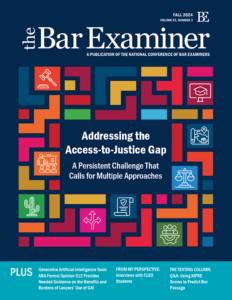This article originally appeared in The Bar Examiner print edition, Spring 2024 (Vol. 93, No. 1), pp. 61-64.
By Darin B. Scheer; Hon. Ann A. Scott Timmer
The NextGen bar examination will debut in July 2026. Wyoming and Arizona were among the initial crop of jurisdictions to announce their adoption of the new exam, with Wyoming’s announcement coming in early November 2023 and Arizona’s following about a month later. Both plan to hold their first NextGen administration in July 2027. The following section outlines their paths to adoption.
The New Frontier of Bar Admissions
By Darin B. ScheerLawyers in Wyoming are big on tradition. We have an informal motto: “Proud to be a Wyoming lawyer.” This phrase honors the community of practitioners who have gone before us. It celebrates traits such as collegiality, hard work, mutual respect, and a deep appreciation for the privilege of serving as keepers of the law. But however quaint this may sound, it would be a mistake to assume lawyers in Wyoming are stuck in the past. To the contrary, practicing law on the frontier has often involved blazing new trails.
Wyoming has been on the leading edge of the law since before it became a state. In 1869, the Wyoming Territorial legislature passed the first women’s suffrage amendment in North America. In 1870, during a period when there were six adult men in the Territory for every adult woman, as many as 1,000 women, including African American women, went to the polls in Cheyenne. The following year, Esther Hobart Morris was appointed as the first female Justice of the Peace in the United States. These developments led to Wyoming being known as the “Equality State,” with the official state motto of “Equal Rights.”
This visionary outlook has continued into the modern era and includes the bar exam. Wyoming adopted the Uniform Bar Exam (UBE) in 2012, becoming the eleventh US jurisdiction to do so. Appropriately enough, the change occurred at the initiative of Chief Justice Marilyn Kite (ret.), the first female justice and chief justice of the Wyoming Supreme Court. After a successful experience with the UBE, the Court decided in October 2023 to adopt the NextGen exam—the fifth jurisdiction in the nation to do so. Chief Justice Kite played a role in this process as well, serving on the University of Wyoming College of Law Advisory Committee and participating in the evaluation of the NextGen exam with the Wyoming Board of Law Examiners (BLE) and Dean Klint Alexander.
The Wyoming BLE had closely monitored the NextGen development process since NCBE initiated its Testing Task Force in 2018. Ultimately, the BLE recommended adoption of the NextGen exam based on the following factors:
- NCBE has consistently provided a statistically valid and reliable bar exam with the UBE;
- NCBE has undertaken a rigorous multiyear process to develop the NextGen exam;
- the new exam is the logical and sensible evolution of the UBE, involving similar doctrinal rigor but emphasizing practical lawyering skills in an integrated question format;
- the NextGen exam will provide score portability, furthering one of the primary objectives behind the Court’s adoption of the UBE; and
- the alternative to the NextGen exam would be for the BLE to return to drafting its own exam, which would not replicate the level of reliability or statistical validity the UBE has consistently provided and the new exam is expected to provide.
By adopting the NextGen exam, the Wyoming Supreme Court ensured that Wyoming applicants will continue to receive many of the benefits that formed the basis for the decision to adopt the UBE, including: (1) test items drafted by committees of law professors, deans, judges, and practicing attorneys from across the nation in a rigorous multiyear process; (2) statistical analysis ensuring that the test items perform in a valid and reliable way; (3) the ability to ensure consistency over time by equating scores—thereby ensuring that examinees’ scores accurately reflect only their proficiency regardless of any potential differences in the difficulty of questions from one administration to another; and, as noted above, (4) portability—NextGen scores can be transferred to other jurisdictions. According to Justice Kari Jo Gray, the Court’s bar admissions liaison to the BLE, “We remain committed to a consistent test that ensures public protection and inspires public trust in the legal system. We adopted the UBE in 2013 based on its meaningful reliability, consistency, and portability. We hope NextGen builds on the success of the UBE and look forward to the rollout.”
Three primary objectives drive the NextGen exam. First, the breadth of knowledge tested will be narrowed to include topics that cross a wide range of practice areas—from litigation to transactional work—that newly licensed lawyers most commonly encounter. Second, the depth of knowledge assessed will be adjusted to more closely reflect the actual practice of law and the level of familiarity a newly licensed lawyer needs for competent practice. Third, the NextGen exam will be an integrated exam, assessing legal knowledge and legal skills holistically in a single practice-related structure.
The new integrated exam item types for the NextGen exam are the result of a multiphase development process, including national pre-testing,1 in which more than 6,000 participants from 116 volunteer law schools—including the University of Wyoming—took simulated exams that included the new items, which were drafted by trained teams of law professors and deans, practicing attorneys, and judges. Following these test administrations, the questions underwent statistical analysis and review by the drafting teams to ensure that they performed as well as current UBE questions. Jurisdictions can thus be confident that the NextGen exam questions will continue to match the rigor of the UBE.
Under the NextGen framework, jurisdictions will continue to (1) determine the eligibility requirements for their applicants to sit for the exam; (2) make accommodation decisions; (3) administer the exam; (4) grade their examinees’ answers; and (5) set their passing standard and portability requirements. For its part, NCBE will provide data to jurisdictions to support their definitions of minimal competence. This will include a concordance table that allows jurisdictions to determine a statistically equivalent NextGen passing score based on the current UBE passing score. NCBE will also conduct a standard-setting study in which experts from across the nation will convene to develop a consensus regarding the potential range of score levels at which examinees might be considered minimally competent to practice law. Finally, NCBE will assist jurisdictions that wish to conduct their own separate standard-setting exercise to determine the appropriate passing score.
When Wyoming administers the NextGen exam in July 2027, it will be on the leading edge of this important evolution in bar admissions, continuing its tradition as a trailblazer. Wyoming is proud to be among the first states to adopt this new exam, and confident that it will best serve aspiring lawyers and the public.
Note
-
- To date, NCBE has conducted five rounds of NextGen pre-testing over three years. A full-length prototype exam is scheduled for October 2024. (Go back)
 Darin B. Scheer serves as Senior Counsel with Crowley Fleck PLLP in Wyoming, representing clients in large natural resource transactional projects and litigation. He is a member of the Wyoming Board of Law Examiners and the NCBE Board of Trustees, where he currently serves as chair-elect. He has also served on NCBE’s policy committees for the Uniform Bar Exam, the Multistate Essay Exam, and the Multistate Bar Exam.
Darin B. Scheer serves as Senior Counsel with Crowley Fleck PLLP in Wyoming, representing clients in large natural resource transactional projects and litigation. He is a member of the Wyoming Board of Law Examiners and the NCBE Board of Trustees, where he currently serves as chair-elect. He has also served on NCBE’s policy committees for the Uniform Bar Exam, the Multistate Essay Exam, and the Multistate Bar Exam.
Adopting the NextGen Bar Examination in Arizona
By Hon. Ann A. Scott TimmerDescribing the nuts and bolts of Arizona’s formal process for adopting the NextGen bar exam takes few words. In early December 2023, my colleagues on the Arizona Supreme Court and I voted to adopt the exam starting in July 2027; that was that. Ascertaining that the new exam would appropriately measure an applicant’s knowledge and skill set and sorting through issues swirling around the exam, however, started well in advance of that December meeting.
The Arizona Supreme Court takes its role as regulator in the self-governing legal profession seriously. Consequently, the justices keep close tabs on all aspects of the bar admissions process, including the bar exam. Our former colleague, retired Chief Justice Rebecca White Berch, chaired the NCBE Board of Trustees from 2017 to 2018. In that capacity, she appointed a task force to undertake a three-year study to ensure that the bar exam continues to measure whether examinees possess the requisite skills to competently practice law. The task force submitted its recommendations to the Board, and the idea of the NextGen exam was born. Thus, the upcoming exam has been on our radar for many years. As Chief Justice Berch left the Board of Trustees, I joined. Through my inside view of the NextGen exam-building process, I was able to give my colleagues in Arizona regular updates about NCBE’s impressive efforts to ensure a thorough and fair exam.
Simultaneously, the Court vetted the exam in other ways. Each year since the NextGen exam’s conception, the Court sent a team comprised of justices, court administrators, licensing division employees, and exam volunteers to NCBE’s Annual Bar Admissions Conference. There, the team learned more about the NextGen exam and asked more pointed questions as it took shape. The Court also invited a team from NCBE to attend our 2023 annual justices-only retreat so we could dispel rumors about the exam (e.g., that it’s intended to “dumb down” the current exam to admit less-qualified applicants) and assure ourselves that adopting it would be in Arizona’s best interests.
As the final step in the Court’s investigation, we asked our Committee on Exams, a volunteer group of lawyers, judges, and public members, to study the issue and recommend whether to adopt the NextGen exam. The committee unanimously recommended that we do so.
This brings us to the Court’s meeting in December 2023. Because of the justices’ lengthy consideration of the new exam’s merits, we engaged in very little discussion regarding the Committee on Exams’ recommendation. We were satisfied that the NextGen exam would accurately measure applicants’ knowledge and skill set to competently practice law in Arizona. Consequently, we quickly voted to adopt.
Most of our discussion centered on whether to start using the exam in July 2026—the new exam’s planned first administration—or July 2027. On the one hand, as an early implementer, Arizona would be able to provide valuable input with a potentially lasting impact on future exam administrations. On the other hand, a later start date would give the Court and the state’s two law schools more time to prepare, and it would allow NCBE to work out any kinks that may arise in initial administrations. Ultimately, the latter sentiment prevailed, and we announced our decision for July 2027.
Our law schools are preparing for the first NextGen administration alongside the Court. As the law schools work on their curricula, we are planning to amend our Court rules to account for the new exam; update our admissions website; modify our forms to reflect all requirements and deadlines for applicants; set new fees; and take other steps to ensure a seamless transition. We also await guidance on score setting, score portability, and exam costs from NCBE.
Just as it did when becoming the seventh jurisdiction to adopt the Uniform Bar Exam in 2011, the Court is placing its trust in NCBE to build an exam to measure minimum competency to practice law in Arizona. The organization hasn’t let us down to date—and we cannot match the expertise and experience NCBE brings to the table. We look forward to our trust being rewarded.
 Hon. Ann A. Scott Timmer currently serves as Vice Chief Justice for the Arizona Supreme Court. Effective July 1, 2024, she will begin a five-year term as the Court’s Chief Justice. Justice Timmer has served on the NCBE Board of Trustees since 2019. She has also served on several NCBE policy committees, including chairing the UBE and MPRE committees.
Hon. Ann A. Scott Timmer currently serves as Vice Chief Justice for the Arizona Supreme Court. Effective July 1, 2024, she will begin a five-year term as the Court’s Chief Justice. Justice Timmer has served on the NCBE Board of Trustees since 2019. She has also served on several NCBE policy committees, including chairing the UBE and MPRE committees.
About the Next Generation of the Bar Exam
Set to debut in July 2026, the NextGen bar exam will test a broad range of foundational lawyering skills, utilizing a focused set of clearly identified fundamental legal concepts and principles needed in today’s practice of law. The skills and concepts to be tested were developed through a multiyear, nationwide legal practice analysis, focused on the most important knowledge and skills for newly licensed lawyers. Designed to balance the skills and knowledge needed in litigation and transactional legal practice, the exam will reflect many of the key changes that law schools are making today. NCBE is committed to ensuring a systematic, transparent, and collaborative implementation process, informed by input from and participation by stakeholders, and guided by best practices and the professional standards for high-stakes testing.
For more information, visit nextgenbarexam.ncbex.org/.
Contact us to request a pdf file of the original article as it appeared in the print edition.







